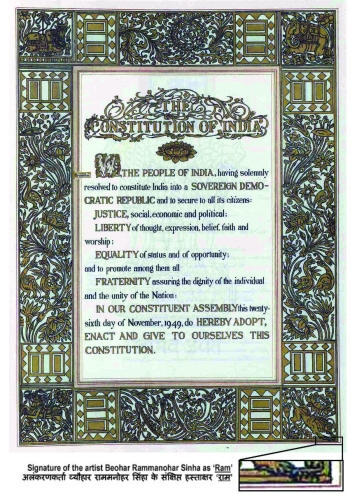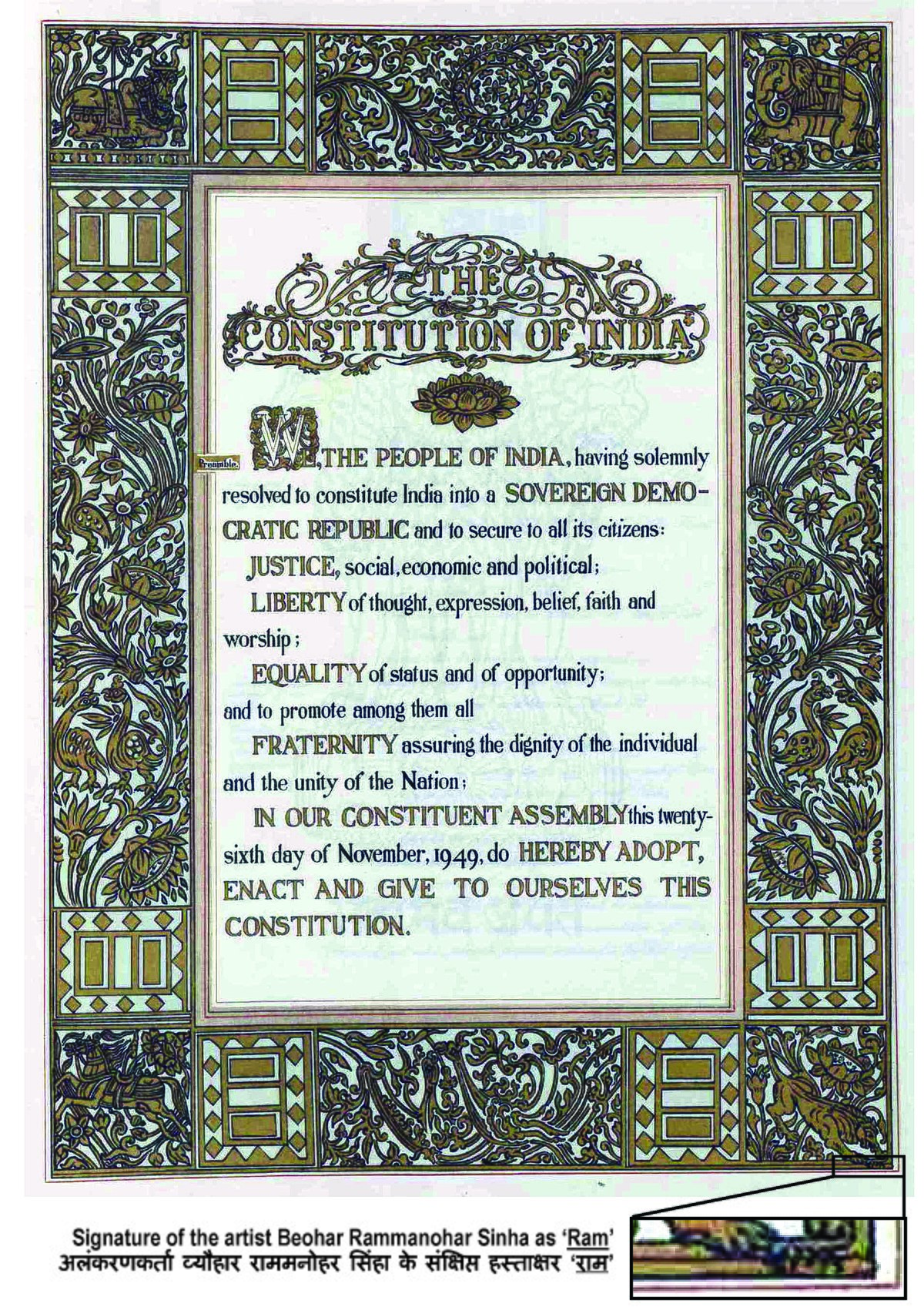
.png) Jacob Peenikaparambil
Jacob Peenikaparambil

Recent statements emanating from Union Law Minister Kiren Rijiju, Vice-President Jagdeep Dhankhar and Lok Sabha Speaker Om Birla give the impression that there is a concerted effort on the part of the BJP government at the Centre to control the judiciary and thereby debilitate the Constitution. Besides, the recent statement of Rashtriya Swayamsevak Sangh chief Mohan Bhagwat regarding Muslims is to be understood in the wider context of the RSS going to celebrate its birth centenary in 2025. The overarching of the Governors in the opposition-ruled states along with their confrontations with the state governments is another aspect of a multipronged strategy. The three-pronged strategy could be read as the push towards the full realization of the dream of the RSS-BJP combine of converting India into a Hindutva Rashtra.
According to Mohan Bhagwat, the “new-found aggression in Hindu society” is because “Hindu society has been at war for over 1,000 years” and it is “but natural for those at war to be aggressive”. “Sangh has offered its support to this cause, as have others. There are many who have spoken about it. And it is because of all these that the Hindu society has awakened,” he said. Clarifying that the “war is not against an enemy outside, but against an enemy within”, the sarsanghchalak said Muslims in India have “nothing to fear” but they must “abandon their boisterous rhetoric of supremacy”. Bhagwat made the above remarks in an interview with the editors of the RSS-affiliated Hindi journal Panchjanya and the RSS-affiliated English weekly Organiser.
Political analysts have interpreted the statement of Bhagwat as a justification of the violent behaviour of the Sangh Parivar members and the discriminatory behaviour of the government. As journalist Ashutosh has written in an article in Free Press, “RSS has realized that as its centenary year is approaching, it is better to expose the full might of its ideology. And in this pursuit every arm of the government has to play a decisive role”. That could be the reason for the Union Law Minister on behalf of the Executive and the Vice-President and the Lok Saba Speaker on behalf of the Legislature harping on the issue of appointment of judges and engaging in an attack on the judiciary. The overarching of the Governors could be seen as a strategy to weaken the federal system of governance and thereby slowly paving the way for a unitary system.
The tussle between the Supreme Court (SC) and the government on the appointment of judges to the SC and HCs that started in the last quarter of 2022 reached its climax on January 16, 2023, when the Union Law Minister wrote to the Chief Justice of India, D. Y. Chandrachud, that the Supreme Court Collegium that decides on judges’ appointments should include government representatives. According to the law minister, “this would infuse transparency and public accountability.”
As long as the higher courts, especially the SC, were delivering verdicts in favour of the government, it had no quarrel with the judiciary. The BJP government wholeheartedly welcomed the Ayodhya verdict. When the higher judiciary pronounced certain judgments not in favour of the government, the latter began to express its opposition to the Supreme Court on the issue of the process of appointing judges to SC and HCs. The government started sitting over the names proposed for appointment as judges of the Supreme Court and High Courts by the Collegium. This resulted in conflicts between the judiciary and the government.
The Collegium system comprises the Chief Justice of India (CJI) as the head, and four other senior most judges of the court. A High Court collegium is led by the incumbent Chief Justice and two other senior most judges of that court. The system was evolved by the Supreme Court. National Judicial Appointment Commission (NJAC) Act, 2014, which was passed by the Parliament, was declared unconstitutional by the Supreme Court in 2015 and the Collegium system is being continued. The NJAC was to comprise the Chief Justice of India as the ex-officio Chairperson, two senior-most Supreme Court Judges as ex-officio members, the Union Minister of Law and Justice as ex-officio member, and two eminent persons from civil society. The government could not reconcile with the scrapping of the NJAC by the SC.
In October 2022, while addressing a gathering in Ahmedabad, the Union Law Minister Mr. Rijiju said that “judges spent half of their time in deciding who to appoint as judges instead of delivering justice”. He also criticized the Collegium system as “opaque” and described the Indian selection system as the only one where judges appoint judges. “The primary task of a judge is to deliver justice to the people. What I see as a law minister (is that) half the time of the judges is spent on deciding who would become the next judge rather than giving justice,” Rijiju said.
The law minister continued his swipe against the Collegium system on several occasions. Speaking at the Times Now summit on November 25, he said the Collegium system is “alien” to the Indian Constitution. “You tell me under which provision the Collegium system has been prescribed,” he asked. “Anything which is alien to the Constitution merely because of the decision taken by the courts or some judges, how do you expect that the decision will be backed by the country,” he questioned.
The attack on the Collegium system was supported by Mr Dhankhar who is also the Chairman of Rajya Sabha. While addressing the all-India presiding officers conference on the role of judiciary, he characterised the Supreme Court Judgement on the NJAC Act as “a glaring instance of severe compromise of parliamentary sovereignty and disregard of the mandate of the people”. He also said, “we cannot have an ostrich-like stance”. Speaker Om Birla added to this by demanding that, “the judiciary was expected to follow the separation of power mandated by the Constitution”. Both the leaders wanted the judiciary to work in harmony with the executive and legislature. Presiding over the Rajya Sabha for the first time as chairperson, Mr. Dhankhar had slammed the Supreme Court for scrapping the NJAC Act.
The Vice-President also questioned the Basic Structure Doctrine evolved by the Supreme Court through its pronouncement in the landmark Kesavananda Bharati case (1973), saying that it does not reflect the correct position of law. According to Dhankhar, the basic structure doctrine has usurped parliamentary sovereignty and goes against the democratic imperative that the elected legislature should reign supreme.
Constitutional experts and opposition leaders have vehemently criticized the stand of the Vice-President and of the Union Law Minister. They have defended the Basic Structure Doctrine, saying that without it, the Constitution and democracy may not survive. According to them, the Constitution is a fundamental document, and it is supreme. It not only creates the three organs of the state — executive, legislature, and judiciary — but also defines their powers and limitations. The basic structure doctrine has helped save the Constitution from being undermined through the misuse of parliamentary majority. The main purpose of the doctrine is to ensure that some fundamental features of the Constitution are not legislated out of existence.
Responding to the stand of Mr. Dhankhar, renowned lawyer Kapil Sibal said that the basic structure includes many elements like the rule of law, the separation of powers, judicial independence, the power of judicial review, federalism, secularism which in this context means religious harmony and respect for disparate religious beliefs etc. “At the heart of the basic structure theory is the concept of judicial review and the supremacy of the Constitution. The supremacy of the Constitution is articulated through rulings of the court. In Kesavananda Bharati case, 13 judges of the court held that there are certain basic features of the Constitution that cannot be amended,” he said.
Senior Congress leader P Chidambaram said that Dhankhar is wrong when he said that Parliament is supreme because the basic structure doctrine was evolved in order to prevent “majoritarian driven assault on the foundational principles of the constitution”.
The confrontation of the Governors with the state governments in the opposition-ruled states is to be viewed from the perspective of weakening the federal system that is opposed to the RSS view of unitary form of government of one country, one nation, and one state with one legislature and one Cabinet for the whole country. It appears that the Centre is trying to usurp the powers of the states through the belligerent assertion by the Governors. The decision of the Tamil Nadu Governor R N Ravi to omit three crucial paragraphs from the speech prepared by the state government for his address to the Assembly amounted to overstepping the role of the constitutional and titular head of the state. The state was called Tamizhagam instead of Tamil Nadu in the invitations sent by the Governor for Pongal get-together at the Raj Bhavan. The letterhead of the invitations bore the Central Government’s seal and not the State Government’s emblem.
The T N Governor is sitting upon a dozen Bills cleared by the Assembly. On the one hand the BJP government at the Centre argues for parliamentary sovereignty in its conflict with the Supreme Court. On the other hand, its Governor is sitting upon the Bills passed by the state Assembly. It appears to be highly hypocritical on the part of the Central government.
It is to be remembered that the RSS did not accept the Indian Constitution when it was adopted by the Constituent Assembly. Three days after the Constituent Assembly passed the Constitution, the RSS mouthpiece, Organizer on November 30, 1949, in an editorial, rejected it and demanded the archaic Manu Smriti, as the Constitution. It read: “But in our Constitution, there is no mention of the unique constitutional development in ancient Bharat. Manu’s Laws were written long before Lycurgus of Sparta or Solon of Persia. To this day, his laws as enunciated in the Manu Smriti excite the admiration of the world and elicit spontaneous obedience and conformity. But to our constitutional pundits that means nothing”.
It appears that, for the time being, the BJP doesn’t want to overthrow the present Constitution. It wants to maintain the form of a democracy with the external forms like legislature, judiciary and other democratic paraphernalia in order to show to the outside world that it is a democracy. At the same time, it is determined to convert India into a Hindutva Rashtra as envisaged by the founders of the RSS. The system of appointment of judges to the Supreme Court and the High Courts along with the supremacy of the Indian Constitution is a stumbling block in the path of the RSS-BJP combine. It has already captured all other institutions and saffronized them to a great extent. What is left out partially is the judiciary. That could be the reason for the relentless attack from different corners on the Basic Structure Doctrine and the Collegium system in view of crippling the Constitution.
No one claims that the Collegium system is fool proof or the best. The government can bring in a new law instead of the NJAC (National Judicial Appointments Commission) after wider consultation with the judiciary and other stakeholders in order to ensure transparency, objectivity and impartiality. But the objective of the current concerted attack on the judiciary on account of the Collegium system by the government appears to be bringing the judiciary under its control in order to transform India into a Hindutva Rashtra.